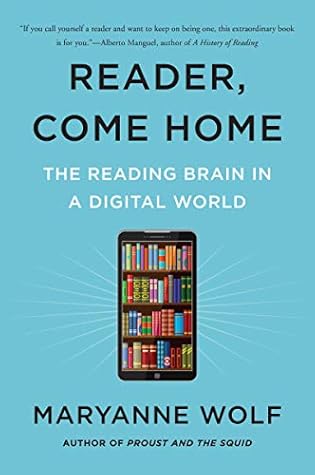More on this book
Community
Kindle Notes & Highlights
Read between
January 27 - January 31, 2019
We need to ensure that human beings do not fall into the trap that Edward Tenner described when he said, “It would be a shame if brilliant technology43 were to end up threatening the kind of intellect that produced it.”
Beauty helps us attend to what is most important. If our perception of beauty becomes reduced to skimming like a water strider across the thin surface of words, we will miss the depths below; we will never be led by beauty to learn and understand what lies beneath.
Some of the more disconcerting and surprising letters I have received over the last years have come from professors of literature and the social sciences who are flummoxed over their college students’ impatience with older, denser American literature and writing. One chair of a well-known English department wrote that he could no longer teach his once sought-after seminar on Henry James because too few students today wanted or were able to read James. Among those professors, the most frequent observations are two. The first is that students have become increasingly less patient with the time
...more
Do you, my reader, read with less attention and perhaps even less memory for what you have read? Do you notice when reading on a screen that you are increasingly reading for key words and skimming over the rest? Has this habit or style of screen reading bled over to your reading of hard copy? Do you find yourself reading the same passage over and over to understand its meaning? Do you suspect when you write that your ability to express the crux of your thoughts is subtly slipping or diminished? Have you become so inured to quick précis of information that you no longer feel the need or possess
...more
Hannah liked this
There is a natural boredom that is part of the woof of childhood that can often provide children with the impetus to create their own forms of entertainment and just plain fun. This is the boredom that Walter Benjamin described years ago as the “dream bird that hatches the egg of experience.”11 But there may also be an unnatural, culturally induced, new form of boredom that follows too much digital stimulation. This form of boredom may de-animate children in such a fashion as to prevent them from wanting to explore and create real-world experiences for themselves, particularly outside their
...more
But I worry about every child. Therefore, I worry very much about the cognitive-developmental trajectories of children who are so constantly stimulated and virtually entertained that they rarely want to go off (screen) to discover their own ability to entertain themselves with their own created hideaways, preferably outside where tangled bushes and sticks become “Martian land,” where a tablecloth over a low-hanging tree branch becomes an Iroquois tent, where their imaginations become immersed in what they are doing, and dinner is served too soon. Time stops in places like these, and thinking
...more
Hannah liked this
To read, we need a certain kind of silence . . . 1 that seems increasingly elusive in our over-networked society . . . and it is not contemplation we desire but an odd sort of distraction, distraction masquerading as being in the know. In such a landscape, knowledge can’t help but fall prey to illusion, albeit an illusion that is deeply seductive, with its promise that speed can lead us to illumination, that it is more important to react than to think deeply. . . . Reading is an act of contemplation . . . an act of resistance in a landscape of distraction. . . . It returns us to a reckoning
...more
Unlike during other great transitions, we have the science, the technology, and the ethical imagination necessary to understand the challenges we face before it is too late—if we choose to do so. As depicted earlier, we need to confront the reality that when bombarded with too many options, our default can be to rely on information that places few demands upon thinking. More and more of us would then think we know something based on information whose source was chosen because it conforms to how and what we thought before. Thus, though we are seemingly well armed, there begins to be less and
...more


